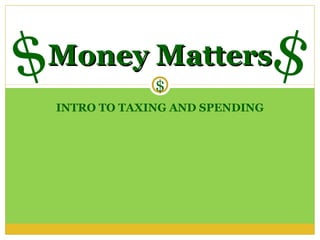
Ch. 5 - Taxing & Spending
- 1. $ Money Matters $ $ INTRO TO TAXING AND SPENDING
- 2. Pre Class How much money do you think the government spends each year? What do you think it spends the MOST money on?? Why should we care about the government’s expenses???
- 3. $ The government spends roughly… $3,600,000,000,000 Per year!
- 4. Where Does Federal Money Come From? $ TAXES! Revenue - Money that the government raises through taxes; all revenue bills MUST begin in the House of Representatives
- 5. TAXES – why should we care? $ Income Tax Social Security is based on a percentage is taken to provide retired of what you make. The people with income they more you make, the need. In 2010 it was 6.2% of higher percentage you your total income! pay! Corporate Excise Tax paid on certain goods Income Tax like alcohol, cigarettes, jewelry, and gas. Just like the personal income tax, corporations must pay income taxes! Other Taxes This includes estate taxes (when someone dies) and taxes on goods brought from other countries (tariffs).
- 6. TAXING Bills House of Rep. – has power to start revenue bills House Ways and Means Committee – decides whether or not to go along with President’s request for tax cuts/increases Makes rules for determining who will pay how much Closed rule – no changes to the bill can be made from the floor of the House Senate Finance Committee Proposes amendments to the tax bills passed by the House Bills become “Christmas trees” – decorated with riders (provisions that about subjects other than the subject of the bill!)
- 7. SPENDING Bills Spending requests usually come from the executive branch (ex. The President’s annual budget) ONLY Congress has the power to appropriate money, or approve of government spending It must APPROVE spending before other departments and agencies can actually spend it! 2 Step Process Authorization bill - sets up a federal program and specifies how much $$$ can be appropriated for it Appropriations process – appropriations committees study requests and create bills stating how much $$ they will grant
- 8. Signs a bill that will build rec centers in inner cities - $30 million can be spent HUD’s budget will Says the Department become part of the of Housing and Urban annual budget that the Development (HUD) President submits to will administer the Congress! program HUD doesn’t have the money!!!! So, it asks Congress for the $30 million (this is an appropriations bill!)
- 9. Appropriations subcommittees – become familiar with federal agencies (like HUD) because each year heads of those programs must speak before the committee, and explain why they need the funds they are requesting Special interest groups – try to influence the members of the subcommittees Ex. A private aeronautics firm might try to get more $$ for the defense Department to build a certain kind of aircraft
- 10. Where Does the Money Go??? $ FEDERAL BUDGET: A plan for how the government brings in and spends revenue
- 11. Where Federal Money Comes From $
- 12. In 1933, federal government spending was 4.6 billion per year – today, that amount would pay for less than one day of the federal government’s expenditures!!!
- 13. Where do your taxes go?
- 15. Types of Spending Mandatory (2/3 of budget) Direct benefits – entitlement programs such as Medicare, Medicaid, Social Security Interest on the national debt Uncontrollables – earlier legislation that legally commits the govt to spend $ - spending NOT controlled by current Congress! Make up MOST of our spending! Discretionary – subject to Congressional appropriates (Congress must approve it each year) Defense, environment, transportation
- 16. Two Possible Outcomes for the Budget $ Deficit earned. More money is spent than Trillions of Dollars In fact the government must borrow money to complete the budget, which increases the DEBT!
- 17. Two Possible Outcomes for the Budget $ Surplus Less money is spent than earned. Trillions of Dollars The government can use the money that is left over for other projects!
- 19. Two Possible Outcomes $ Deficit: Surplus: more money less money spent than spent than earned earned
- 20. Budget Process
- 22. Conflicting Feelings about Government Benefit Where do some residents who were interviewed stand on government spending on social programs? Where do YOU think about government spending?
- 23. Special Interest Groups any organization that seeks to influence public policy Examples: American Civil Liberties Union – civil liberties/rights National Rifle Association – gun ownership rights Sierra Club – protecting the environment Veterans of Foreign Wars – Veterans’ healthcare and benefits These groups lobby Congress contact members of Congress or other government officials directly to influence their law making
- 24. Jack Abramoff
Hinweis der Redaktion
- PARKS and REC clip – start at 53 seconds
- Say a president signs a bill to build recreational facilities in inner cities – funds must be authorized, then appropriated